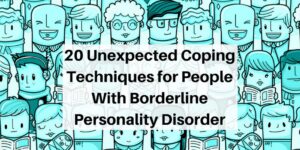Cannabis for Borderline Personality Disorder: Does it Help?
BY Paul James
Published in Weed World magazine issue 168
Since cannabis affects the regulation of emotions, some have argued that it can help in relieving stress from personality disorders.
Borderline personality disorder (BPD) is a condition that most affects emotional regulation and impulse control. Being that it’s often caused by trauma, it shares similar traits to post-traumatic stress disorder (PTSD). And there’s been a lot of research revealing cannabis can help with that mental condition. ¹
However, with cannabis’s psychoactive properties, there’s some debate as to whether or not you can use cannabis for borderline personality disorder. Throughout this article, we will examine the topic and the research backing up this information.
What is Borderline Personality Disorder?
Borderline personality disorder (BPD) is a mental health condition that affects the way you think and feel about yourself and others. As a result, this can cause problems in day-to-day life that will result in the following symptoms: ²
- Feelings of emptiness
- Impulsive and risky behavior (i.e., gambling, unsafe sex, drug abuse)
- Inappropriate and intense anger
- Intense fear of abandonment (usually going to extreme measures to avoid real or imagined separation)
- Rapid changes in self-identity and self-image
- Severe mood swings
- Stress-related paranoia (loss of contact with reality)
- Suicidal ideation and self-injury
- Unstable relationships
Unfortunately, researchers aren’t 100% sure what causes BPD. Most agree it has a lot to do with an individual’s environment. People who have experienced child abuse and neglect tend to be more likely to experience the condition. However, genetics and brain abnormalities may also play a role.
Naturally, BPD makes a person’s life much more complex and can negatively impact important areas, including job, school, social activities, self-image, and intimate relationships. It can also lead to other mental health disorders, including depression and anxiety.
How is BPD Treated?
Currently, no medications are approved by the Food & Drug Administration (FDA) for BPD. Instead, a doctor may prescribe medicines for co-occurring ailments, such as depression.
To directly address BPD, most psychiatrists recommend psychotherapy (or talk therapy). The goals of this treatment are to ³
- Decrease your impulsive tendencies
- Improve upon relationships
- Focus on your ability to function
- Learn more about BPD
- Teach you how to manage emotions
Still, due to the lack of medication, many with BPD are seeking out alternatives to ease symptoms. And one substance that consistently gets brought into question is marijuana.
Cannabis for Borderline Personality Disorder
In the United States, you won’t find many states authorizing the use of medical cannabis for personality disorders. This is simply because there isn’t enough research concerning this topic.
However, that’s not to say cannabis can’t help. When inhaled, cannabinoids from the cannabis plant either directly or indirectly interact with the endocannabinoid system (ECS). This system plays an essential role in several functions in the brain and body, including emotional regulation. ⁴
Since people struggling with BPD struggle with emotional regulation, this may be helpful. More specifically, some have argued that cannabis can help with specific symptoms of BPD, including aggression, depression, and anxiety. ⁵
Still, there is one potential downside to cannabis. Tetrahydrocannabinol (THC), the main active ingredient in marijuana, can cause feelings of dissociation, namely, in high doses. People with BPD are already susceptible to a loss of contact with reality.
As a result, individuals with BPD may experience paranoia from marijuana. Naturally, paranoia is a potential risk everyone experiences from THC. Most research agrees that if you’re susceptible to heightened anxiety, it’s best to start your marijuana journey in small doses. ⁶
What About CBD?
While cannabidiol (CBD) may also help emotional regulation, its biggest perk is the fact that it’s non-psychoactive. Therefore, those susceptible to paranoia may prefer this cannabinoid over THC.
Like THC, CBD activates the brain’s serotonin receptors (the “happy chemical”). ⁷ That said, it also holds the potential to combat specific symptoms of BPD, including anxiety and depression.
On top of this, CBD contains omega-3 fatty acids. These can act as an anti-inflammatory in the brain and may improve cognitive function. ⁸
Case Study Finds Cannabis May Help BPD When THC and CBD Are Paired
As mentioned, we have limited research when it comes to cannabis and BPD. However, a recent study published by the Multidisciplinary Digital Publishing Institute (MDPI) has looked into the matter. ⁹
This study looked into seven patients diagnosed with emotionally unstable personality disorder (EUPD), which is just another term for BPD. These patients were then given products containing both THC and CBD in varying ratios over one month.
Six of the seven patients claimed they felt “an improvement in symptoms.” On top of this, “none of the participants reported any adverse side effects.” As the study’s authors concluded:
“To our knowledge, this case series represents the first medical evidence of the use of CBMPs [cannabis-based medicinal products] for the clinical management of patients with a diagnosis of EUPD… [Our] results suggest that, when deployed in a rigorously controlled clinical environment, CBMPs can substantially improve the symptoms associated with EUPD, thus warranting further research on this therapeutic strategy.”









Be First to Comment